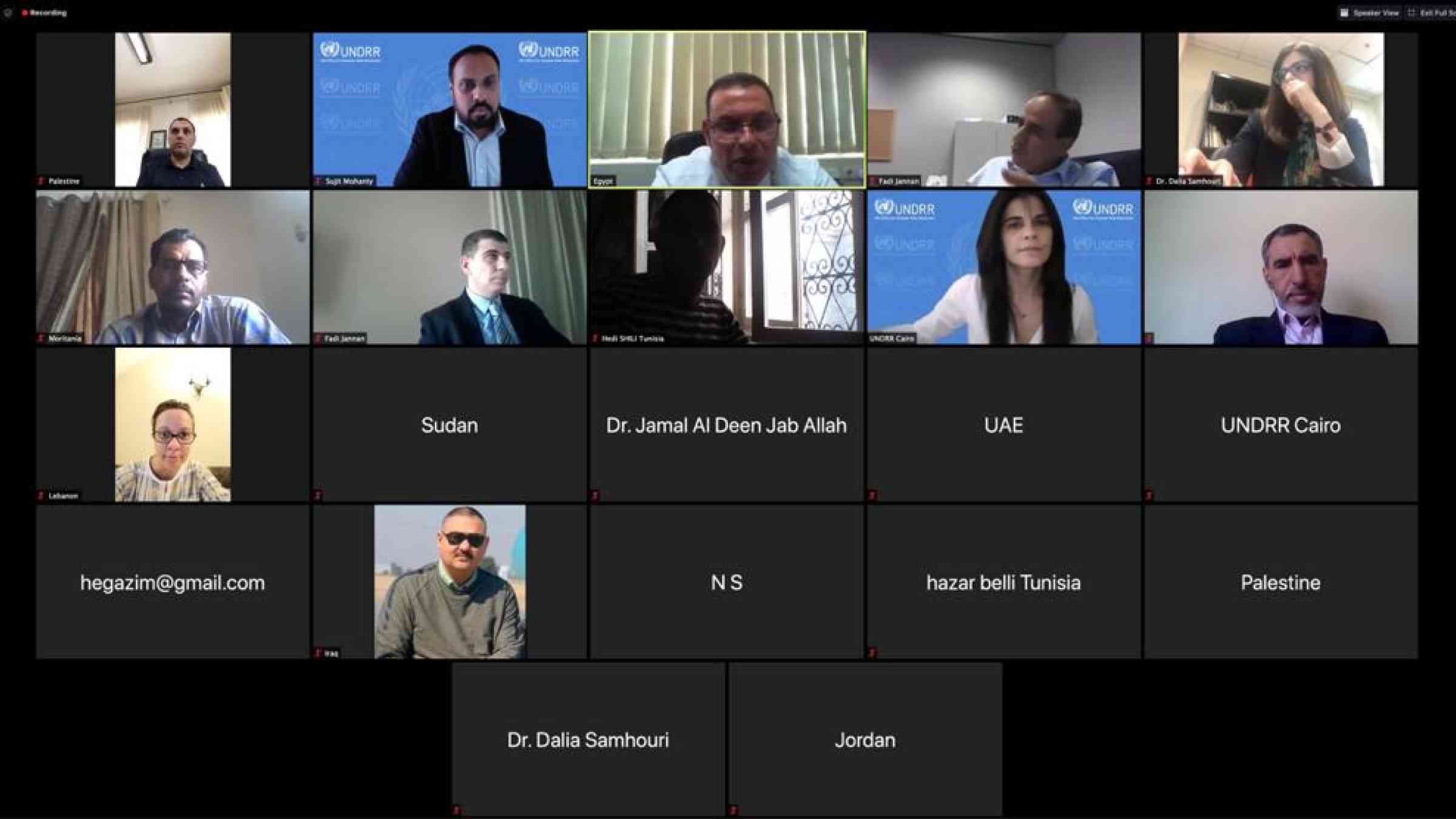10 Arab Countries Shared their Lessons Learned in Preparing & Responding to COVID -19 During their Participation in UNDRR ROAS Webinar

The inevitable impact of COVID 19 and its impact globally and on all Arab countries is far more than a health crisis, it is affecting societies and economies in multiple ways. While the impact of the pandemic varies from one country to another, it will most likely lead to increased poverty and exacerbated inequalities at a global scale, making achievement of SDGs even more urgent.
As part of the continuous effort exerted by UNDRR to engage and support countries to reduce disaster risks, the Regional Office for Arab States organized a regional knowledge exchange and policy dialogue webinar with the national DRR focal points and invited panelists from the League of Arab States (LAS) and World Health Organization (WHO).
Mr. Sujit Mohanty, Chief of UNDRR ROAS led the webinar discussion and brought the attention to the Sendai Framework and its inclusion of biological hazards and health aspects in DRR. He confirmed that several countries have included these in their national strategies. However, the unprecedented nature of this pandemic is also a wakeup call for all of us to strengthen not only inclusion of biological hazards, epidemics and pandemics more prominently in national level, preparedness, response, mitigation and prevention planning, but also include aspects of managing and preventing multiple and cascading risks in national and local level planning processes.
Mr. Mohanty said: “It will only be possible if a whole of government and whole of society approach is taken in disaster risk reduction and this was highlighted through the ‘Bangkok Principles for the implementation of health aspects in Sendai Framework for DRR 2015-2030’ that emanated from an International conference on the implementation of the health aspects in SFDRR organized jointly by WHO and UNDRR in March 2016 in Bangkok”. He added: “The recommendations from this conference paves the way forward for all of us in integrating health aspects and biological hazards in DRR”.
Dr. Djamel Djaballah, Director of Water, Housing and Disaster Risk Reduction, League of Arab States confirmed that all Arab countries took several measures to fight COVID 19 and its impact including precautionary procedures to prevent the spread of the disease, such as travel restrictions, social deportation measures, school closures, curfews, and innovative methods of prevention. He also added that most Arab governments have monitored financial aid to some sectors and families affected by COVID 19 including bank facilities, rescheduling and postponing loans and taking measures to provide basic needs for individuals in light of the partial or complete closure.
Dr. Jamal said: “One of the most important sectors that will be affected by this disaster is the food security sector due to the low strategic stocks and the lack of employment as a result of restricting movement and the negative effects that this shortage will have on cultivated areas, production and harvest for the current season and upcoming seasons and its impact on food prices”.
Dr. Dalia Samhouri, Manager, Emergency Preparedness & International Health Regulations - WHO highlighted the current situation in the Arab states in response to the pandemic and the significance of multi sectoral coordination and collaboration tackling the COVID19 emergency by WHO. Also she provided insights related to Recovery & Resilient Health System in the context of COVID: Operationalizing Bangkok Recommendations for Sendai Framework.
The webinar allowed 10 Arab counties including Jordan, UAE, Tunisia, Sudan, Iraq, Palestine, Lebanon, Egypt, Morocco and Mauritania to elaborate on the role of the national DRR institutions been playing in COVID-19 preparedness, response and recovery efforts. Also shared the different measures and approaches taken to address the broader socio-economic impact of the pandemic in their countries and their perceptions towards the role of the international development community including the League of Arab States and the United Nations in strengthening the capacity of Arab countries in combating biological hazards and epidemics in the future.
Number of countries highlighted the unprecedented nature of COVID 19 that impacted their countries beyond being a health disaster and governments echoed the need for strengthening the capacity of countries in managing multiple risks.
UNDRR ROAS focal point in Jordan at the National Centre for Security & Crises Management, Mr. Ali Bani Yasen, Director of Operations and Plans emphasized on the positive impact of the prevention measurements taken by the Jordanian government as it declared a state of emergency as part of a series of measures to curb the spread of COVID-19 and activated the "Defense Act of 1992 that gives the prime minister broad powers to restrict basic rights.
Mr. Ahmed Al Kathiri, National Coordinator of Sendai General Framework, at the National Authority for Emergency, Crisis and Disaster Management confirmed that the UAE has responded effectively, efficiently and wisely to reflect the full readiness of the strategy to deal with crises in the UAE that started dealing with the crisis since January 2020, by activating the National Operations Center, which began providing information and activating all plans in different sectors.
Mrs. Hazar Belli, Head of Service at the Ministry of Local Affairs and Environment in Tunisia explained the actions related to the principles of strategic governance developed to serve the fight against COVID 19 which included public institutional mechanisms and the horizontal participatory mechanisms similar to establishing and activating participatory mechanisms at the local level. Also, she emphasized on the importance of developing international and bilateral cooperation and the significance of sharing experiences.